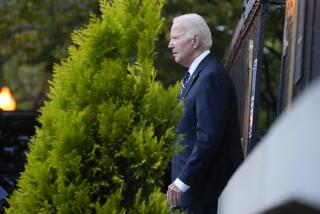The President vs. the Presidency
The White House is reeling from allegations that both President Bush and Vice President Dick Cheney engaged in business practices that are disturbingly similar to those of executives at Enron and WorldCom. Like administrations before it, this White House now must choose between serving the greater interests of the office of the presidency or the narrower goals of the current officeholder. If last week was any indication, Bush officials have chosen a dangerous path of personal devotion over public duty, a path that has led previous administrations to disaster.
The recent allegations--which may prove overblown under closer scrutiny--center on transactions by Bush and Cheney when they were executives at Harken Energy Corp. and Halliburton Co., respectively. Among the unproven allegations are insider trading, questionable personal loans and fraudulent dealings. The White House staff has put on a full-court press to refute these allegations of private misconduct. In doing so, the administration is drifting into the troubled waters in which the Clinton administration found itself.
The failure to distinguish between a president’s personal and public matters creates a perilous ambiguity for public officials. As shown in the Clinton administration, the involvement of White House officials in private matters often converts a limited personal scandal into a full-blown public crisis.
The Clinton White House staff was denounced for becoming deeply involved in the personal litigation of the Clintons. Staff members coordinated a media and political campaign, including daily faxes attacking critics.
President Clinton’s former White House counsel, Bernie Nussbaum, resigned under criticism that he could not distinguish between personal and public matters of representation. Courts cited this confusion in rulings against the White House. Claims of presidential and attorney-client privilege were rejected because of the intermingling of private and public functions. In fact, one of the proposed articles of impeachment against Clinton involved the misuse of White House staff for personal purposes. Nor was Clinton the only president to face such criticism; Richard Nixon was accused of using public officials and resources for improper purposes.
The Bush administration’s management of the current scandal seems remarkably Clintonesque. The Bush White House immediately became embroiled in the merits of the allegations of personal wrongdoing, including matters currently under investigation. White House Press Secretary Ari Fleischer and others defended the president’s actions as a citizen and stated that the White House was consulting with “private accountants and private counsels” as part of its response. The White House staff coordinated the response to the allegations, even sending allies fax answer sheets (a la Clinton) titled “If You Get Asked About Harken.”
Fleischer has also used his public office to declare that the Cheney allegations, which have yet to be adjudicated, are “without merit,” and other staffers have been briefing media in the matter.
It is during personal scandals that public officials must decide whether they are working for the presidency or the president. Whether to decline to assist an embattled and much-loved president may be the most difficult test of principle for any public official.
Yielding to the natural desire to protect a president in a personal crisis can deepen a scandal and cut a staff adrift in a sea of conflicts and compromises. It is also wrong in a system based on laws and not men. These officials work for the public, and there is much public business to be done.
The fault for this blurring of public and personal duties must be laid at the feet of White House Counsel Alberto Gonzales. It is his responsibility to maintain the bright line between official and personal concerns. When there is a divergence between the interests of the presidency and those of the individual president, the White House counsel must protect the presidency. It is his unpleasant duty to go to the president and vice president and ask that they retain personal counsel and not use public employees for this work.
Likewise, it is Fleischer’s difficult duty to decline to make official comment on the merits of pending investigations or lawsuits involving alleged personal misconduct. He does not have to become a mute. Rather, he can refer to the president or vice president’s denial of any wrongdoing and refer questions to private counsel.
Ironically, it was Fleischer who warned Americans after Sept. 11 that “people have to watch what they say and watch what they do.” It is sound advice for the White House staff in the coming weeks.
More to Read
Inside the business of entertainment
The Wide Shot brings you news, analysis and insights on everything from streaming wars to production — and what it all means for the future.
You may occasionally receive promotional content from the Los Angeles Times.










